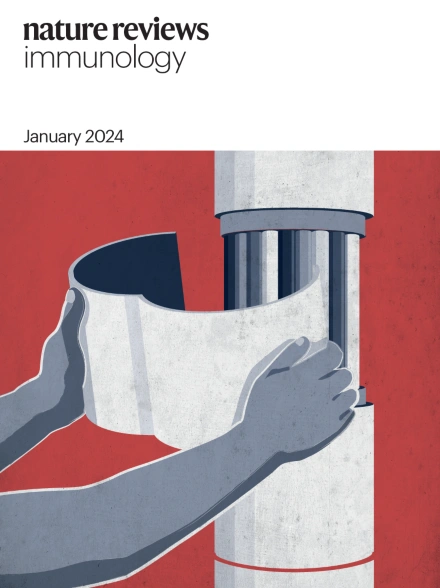相扑家族的免疫调节
IF 60.9
1区 医学
Q1 IMMUNOLOGY
引用次数: 0
摘要
小泛素样修饰物(SUMO)家族的翻译后蛋白修饰已被证明在感染、自身免疫和最近的癌症背景下调节免疫细胞。最近的临床试验研究了sumoylation抑制作为治疗癌症的方法,已经确定了sumoylation具有重要的免疫调节作用。Sumoylation通过直接修饰先天免疫细胞和细胞毒性T细胞中的转录因子来抑制这些因子,从而导致含有组蛋白去乙酰化酶的转录抑制复合物的募集。相反,在调节性T细胞和T辅助性17细胞中,转录因子的sumoylation可以通过募集转录辅激活因子来增强转录活性。Sumoylation也参与IFNB1和内源性逆转录病毒的抑制,因此对调节干扰素表达很重要。文献中的一个中心主题是,一组蛋白质的聚合化,而不是一个单一的目标,共同有助于调节各种免疫过程。在这篇综述中,我们认为这些研究如何为未来探索sumo介导的免疫调节治疗癌症和自身免疫性疾病提供科学依据。本文章由计算机程序翻译,如有差异,请以英文原文为准。


Immune regulation by the SUMO family
Post-translational protein modifications by the small ubiquitin-like modifier (SUMO) family have been shown to regulate immune cells in the context of infection, autoimmunity and, more recently, cancer. Recent clinical trials investigating sumoylation inhibition as a therapeutic approach for cancer have established that sumoylation has important immune modulatory effects. Sumoylation suppresses transcription factors in innate immune cells and in cytotoxic T cells through the direct modification of these factors, which leads to the recruitment of transcriptional repressor complexes containing histone deacetylases. By contrast, in regulatory T cells and T helper 17 cells, sumoylation of transcription factors can enhance transcriptional activity by recruiting transcriptional coactivators. Sumoylation is also involved in the repression of IFNB1 and endogenous retroviruses and is therefore important for regulating interferon expression. A central theme from literature is that the sumoylation of a group of proteins, instead of a single target, collectively contributes to the regulation of various immune processes. In this Review, we consider how these studies provide scientific basis for future exploration of SUMO-mediated immune modulation for the treatment of cancers and autoimmune disorders. In this Review, the authors explain how post-translational protein modification by the small ubiquitin-like modifier (SUMO) family is emerging as an important regulator of immune cell function. Notably, inhibition of sumoylation is showing promise as a cancer therapy and may also have therapeutic use in various autoimmune conditions.
求助全文
通过发布文献求助,成功后即可免费获取论文全文。
去求助
来源期刊

Nature Reviews Immunology
医学-免疫学
CiteScore
93.40
自引率
0.40%
发文量
131
审稿时长
6-12 weeks
期刊介绍:
Nature Reviews Immunology is a journal that provides comprehensive coverage of all areas of immunology, including fundamental mechanisms and applied aspects. It has two international standard serial numbers (ISSN): 1474-1733 for print and 1474-1741 for online. In addition to review articles, the journal also features recent developments and new primary papers in the field, as well as reflections on influential people, papers, and events in the development of immunology. The subjects covered by Nature Reviews Immunology include allergy and asthma, autoimmunity, antigen processing and presentation, apoptosis and cell death, chemokines and chemokine receptors, cytokines and cytokine receptors, development and function of cells of the immune system, haematopoiesis, infection and immunity, immunotherapy, innate immunity, mucosal immunology and the microbiota, regulation of the immune response, signalling in the immune system, transplantation, tumour immunology and immunotherapy, and vaccine development.
 求助内容:
求助内容: 应助结果提醒方式:
应助结果提醒方式:


